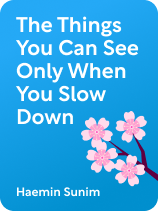

This article is an excerpt from the Shortform book guide to "The Things You Can See Only When You Slow Down" by Haemin Sunim. Shortform has the world's best summaries and analyses of books you should be reading.
Like this article? Sign up for a free trial here.
Do you feel constantly busy and struggle to take time to rest? What is the value of slowing down? How can you practice slowing down?
In The Things You Can See Only When You Slow Down, a book by Zen Buddhist teacher Haemin Sunim, you’ll learn how embracing slowness can lead to increased self-awareness and contentment. He shares practices that encourage you to slow down, forge deeper connections, and enhance your well-being.
Keep reading for an overview of the book and its principles.
The Things You Can See Only When You Slow Down
In the book The Things You Can See Only When You Slow Down, Haemin Sunim encourages readers to discover the peace and clarity that come from slowing down in our fast-paced world. Through personal anecdotes, philosophical insights, and motivational quotes, Haemin explores how adopting a slower approach can reveal deeper truths and lead to greater happiness. By sharing his observations on how people live today and suggesting ways to find balance amidst overwhelming demands, Haemin offers readers a roadmap toward living more mindfully and compassionately—with oneself and others.
Haemin is a Zen Buddhist teacher, author, and professor. He was born in South Korea, and his spiritual journey led him to the United States, where he pursued an education that culminated in a Ph.D. from Princeton University. Educated at UC Berkeley, Harvard, and Princeton, he received formal monastic training in Korea and taught Buddhism at Hampshire College in Amherst, Massachusetts.
His teachings often focus on applying ancient Buddhist principles to solve contemporary issues, highlighting the universal need for inner peace amidst societal pressures. Haemin has reached a wide audience through traditional lectures, retreats, and social media engagement. He has more than a million followers on X (@haeminsunim) and Facebook. Beyond writing and teaching, Haemin founded the School of Broken Hearts in Seoul, an institution dedicated to helping people navigate life’s challenges through spiritual growth.
In this guide, we’ve reorganized Haemin’s advice into four guiding questions:
- Why do we feel so busy?
- What’s the value of slowing down?
- How can you slow down?
- What do you begin to see when you slow down?
Throughout, we’ll explore philosophical and psychological perspectives on Haemin’s ideas and supplement his advice with tips on how to implement his suggestions in your daily life.
Why Do We Feel So Busy All the Time?
Today, the sensation of being perpetually busy has become a common complaint. Haemin suggests that this feeling of busyness and restlessness are not objective truths, but a reflection on our state of mind: He argues that the world itself is not inherently busy but that the chaos of our minds makes it feel busy. The more cluttered our minds are, the more chaotic our world seems. Therefore, according to Haemin, the key to experiencing calmness and tranquility lies in calming your mind rather than trying to control the world around you.
What Is the Value of Slowing Down?
Haemin argues that if you want to feel less busy, you need to intentionally slow down, which means living in the present moment. In doing so, he explains, you’re better able to observe, understand, and appreciate what you might otherwise overlook in the rush of daily commitments and challenges.
For example, consider a routine activity like commuting. Typically, when you commute, you’re focused on reaching the destination quickly (future thinking), leading to potential frustration or stress when you hit traffic or have to stop for gas. This mindset can result in overlooking details of the experience that could offer value or enjoyment.
By applying Haemin’s advice to slow down, the experience of the same commute changes. Taking the time to observe your surroundings, like noticing the way light filters through trees or observing the people around you, allows for a richer experience of the same journey. Slowing down not only changes what we notice but also affects our internal state, often leading to a more relaxed and positive mindset.
How Can You Practice Slowing Down?
According to Haemin, slowing down isn’t just about physically pausing—it’s also about deliberately shifting your mindset. He explains that to slow down, you must change your internal response to your external world. He suggests taking a more objective, observant stance in response to your environment, interactions, and thoughts. For example, instead of reacting emotionally to a challenging situation, you might step back to observe and analyze it dispassionately, noting details and patterns without immediate judgment. This shift not only enriches your experience of the world but also supports a more balanced and thoughtful approach to life.
The best way to practice this mental shift, Haemin writes, is to commit to a mindfulness practice.
Commit to a Mindfulness Practice
According to Haemin, mindfulness is an essential tool for slowing down. Mindfulness is the focused awareness of the present, especially of your internal states like thoughts and emotions, without ascribing value or judgment to them. This practice does not mean ignoring your mental and emotional processes but rather recognizing and accepting that they’re temporary. Haemin argues that mindfulness allows you to feel calmer and enriches your experiences by allowing you to savor each moment fully and recognize its fleeting beauty.
According to Haemin, this approach to mindfulness requires a level of detachment that allows you to observe your internal dynamics without judgment. By maintaining this nonjudgmental observation, you’re less likely to be consumed by negative emotions or thoughts, and will be able to acknowledge their presence without allowing them to dictate your reactions.
Haemin emphasizes that the disciplined practice of mindful observation mitigates the impact of negative thoughts and emotions and also enhances your self-awareness. Knowing your patterns, habits, and emotional triggers allows you to respond more thoughtfully, leaving you better equipped to deal with life’s challenges with equanimity and intention.
What Do You Begin to See When You Slow Down?
Haemin explains how when you use mindfulness, you begin to see things that were invisible when you were rushing from one thing to the next. In slowing down, he explains, you start to fully appreciate what matters in life: humility, relationships, and the present moment. You also learn how to better listen to yourself and find your way forward.
The Value of Humility
According to Haemin, when you slow down you begin to see the value of humility in navigating both your professional and personal life.
In professional settings, humility transforms the workplace dynamic by encouraging collaboration instead of competition. By allowing you to acknowledge the contributions of every team member and recognize your mutual dependence, humility counters the often relentless pursuit of personal success. This shift in perspective not only enhances workplace productivity and satisfaction but also cultivates a healthier, more cooperative environment.
Humility also enriches your personal relationships. Haemin emphasizes the importance of approaching all relationships with curiosity and the belief that everyone has something to teach you, regardless of their background or beliefs. This attitude breaks down barriers and opens you up to the diversity of human experiences and wisdom. By remaining open and humble, you can enrich your relationships, gaining a deeper understanding and appreciation for the people in your life.
Most importantly, Haemin explains, humility helps you recognize the limitations of your control. Haemin argues that when you acknowledge that you can’t control everything, you start to reconsider what truly matters because you begin to focus your energy and attention on aspects of life within your influence. This realization makes you less anxious over uncontrollable circumstances, fostering a more profound appreciation for the present moment.
The Importance of Relationships
When you slow down, you’re better able to recognize the things that bring value to your life. For Haemin, nurturing connections and building relationships is key to finding happiness and understanding yourself. He believes that relationships are crucial because they offer a mirror through which we can see ourselves more clearly, highlighting both our strengths and areas for growth. They ground us, providing comfort during tough times and joy in the good ones while fostering a sense of belonging and community. Essentially, Haemin underscores that by connecting deeply with others, you remind yourself that you’re not alone but part of something bigger than yourself.
Haemin adds that to maintain strong relationships, you need to find a balance between intimacy and independence. Too much of either can lead to feelings of suffocation or isolation, respectively. For example, a parent who keeps their teenager on a very tight leash might think they’re being protective, but it can lead to the teen feeling stifled and craving independence. Or, on the flip side, giving the teen too much freedom without enough check-ins can leave them feeling neglected and unloved.
Haemin adds that to have healthy relationships, you must learn how to forgive. Forgiving someone for their mistakes allows you to move forward without being burdened by resentment or emotionally tied to past grievances or conflicts.
The Gift of Each Moment
Slowing down, Haemin explains, also allows you to be fully present. This makes it possible to appreciate the value of each moment, whether it brings joy or heartache. He argues that in our high-speed world, we often find ourselves rushing from one task to the next, so caught up in our responsibilities and digital distractions that we miss the intricate details and simple pleasures that surround us.
Slowing down allows you to create the space needed for deeper reflection, which in turn brings clarity, especially during difficult times. Haemin emphasizes the importance of gracefully accepting life’s ups and downs—understanding that joy and sorrow are interconnected. Slowing down is not about avoiding challenges; rather, it’s about confronting them with mindfulness and compassion toward ourselves and others. In adopting this gentle approach, you can find significance in both hardships and joys, seeing them as essential elements of life’s richness that offer opportunities for learning and growth.
Your Place in the World
Finally, Haemin explains, when you slow down, you’re better able to listen to your inner voice and give yourself the space to understand what motivates you. Slow living affords you the time to reflect on your experiences, recognize what brings joy, and understand the unique contributions you can make to the world. When you follow your own passions instead of chasing external validation, your life will be richer and more rewarding.
However, Haemin suggests tempering your enthusiasm when you pursue your passion to prevent potential conflicts or burnout. He argues moderation is crucial to ensure that your pursuits remain fulfilling and sustainable. By managing your enthusiasm, Haemin writes, you can ensure that your passions enrich your life without depleting your energy or straining your relationships.
Exercise: Recognize the Limitations of Your Control
Haemin teaches us the importance of acceptance, emphasizing that much of our suffering comes from our desire to control situations and outcomes.
- Think of a recent situation where things didn’t go as planned or as you’d hoped. Take note of the emotions you felt at that moment. Were you frustrated, disappointed, or anxious?
- Identify which elements within that situation were within your control and which weren’t. Could there have been a different outcome if you’d focused solely on the aspects within your control?
- Reflect on how you can handle such situations differently in the future. What steps can you take to cultivate greater acceptance and peace when faced with things outside of your control?
Exercise: Identify Moments of Calm
Become aware of the quiet moments in your day and learn how to make more space for them.
- List three activities that brought you a sense of calm or peace today, however fleeting it may have been.
- For each activity, write one sentence describing why this activity felt peaceful.
- How could you incorporate more of this type of activity into your daily life?

———End of Preview———
Like what you just read? Read the rest of the world's best book summary and analysis of Haemin Sunim's "The Things You Can See Only When You Slow Down" at Shortform.
Here's what you'll find in our full The Things You Can See Only When You Slow Down summary:
- Why we feel continuously busy and overwhelmed
- How embracing slowness can lead to increased self-awareness and contentment
- The importance of curbing your enthusiasm when pursuing your passion






